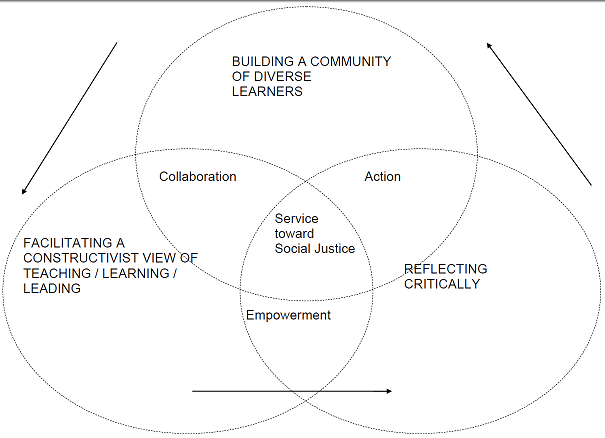“Knowledge Brings Us Together”
Building Community while
Constructing Knowledge to Serve a Pluralistic Society

In addition to the traditional classroom delivery model, College of Education courses may be offered online in a synchronous or asynchronous format. Webinar and Video lecture formats as well as Hybrid face-to-face and online models may be used.
The College of Education (COE) includes the undergraduate and graduate education programs.
Heritage University, according to its mission statement, strives to provide a quality education for multicultural populations that have not traditionally had access to higher education. It was the need for such access, and the desire to create an environment in which individuals could develop their human potential and a sense of empowerment, that brought people together to create the institution. The goal for students of the COE is personal transformation within a supportive, pluralistic community of learners, which will result in improvement in the community at large. Implied within its mission statement and the university’s motto, “Knowledge Brings Us Together,” are the valuing of a richly diverse learning community, active engagement in the learning process, and the continuing development of a just and pluralistic society through service.
The College of Education, including the certification programs for teachers and education administrators, has devised a conceptual framework to guide the development and ongoing improvement of its programs. Flowing from the mission statement and motto of the University, as well as a knowledge base reflecting research-based models of best practice, faculty of the college have expressed the heart of the conceptual framework in the following statement: “Knowledge brings us together: Building community while constructing knowledge enables us to serve a pluralistic society.”
According to this conception, a safe, caring, and diverse community in which each individual is respected allows people to collaborate in the socially mediated process of constructing knowledge. This leads to a sense of individual and collective empowerment, allowing students the confidence, courage, and desire to reflect on their aims and practices, as well as the context in which these occur. This process of critical reflection is essential if the student is to improve the quality and appropriateness of their future actions or the context in which those actions will occur. Educators serve the needs of a pluralistic society by working to meet the needs of all students; they serve the needs of a just society by challenging the inequities of the status quo…
The conceptual framework not only defines what is expected of the university’s students and graduates but also what is expected of the faculty and staff. The latter is reflected in the statement of philosophy for the college: “The College of Education is a community of learners — faculty, staff, and students — committed to encouraging dialog and cooperation, to facilitating a process by which learners actively construct meaning, and to continuing improvement through critical reflection and action.”
The certification programs in Teacher Education, Educational Administration, and Program Administration are approved by the Professional Educator Standards Board (PESB). Furthermore, all Heritage programs in education, psychology, and counseling are part of the University’s accreditation through the The Northwest Commission on Colleges and Universities (NWCCU). The College of Education and the College of Arts and Sciences work collegially when students are taking academic courses in math, science, English, and humanities so students are being prepared in academic subject areas as well as in how to teach (pedagogy). Our M.Ed. in Counseling program and application materials are currently under review. Please review catalog addenda for updated information.
The desired outcome for each graduate of the Teacher Preparation Program is the demonstrated ability — through evidence of student learning — to positively impact the learning of each student served in K-12 classrooms. This goal is constantly monitored by both faculty and students. Students of the program are actively engaged in the collection of evidences from the beginning to the end of program that reflect competencies acquired and mastered in content and pedagogy.
COE builds partnerships with various organizations across the regions that Heritage University serves. Early Childhood Studies is an example of an innovative and diverse curriculum aligned to community needs. This B.A. program is for candidates wishing to work with young children–birth through preschool. The program offers opportunities to combine theory and practice through application experiences in early childhood settings. The Early Childhood Studies program offers a choice of specialization with the following emphases: birth to three years, special needs students, or agency leadership. These specialization options are designed to meet the professional goals of each candidate.
The College of Education also provides in-service courses and programs for teachers and other education personnel. These programs are often delivered through collaborations with state, local, and regional leaders and specialized content experts. They include specialized program support in such areas as professional-level certification (ProTeach) and National Board Certification, which may or may not include enrollment in graduate education programs.
The annual Heritage University report on teacher preparation is provided to the Office of the Superintendent of Public Instruction (OSPI). In accordance with Title II reporting guidelines, OSPI files the annual report for Washington State with the U. S. Department of Education. This report is available in hard copy upon request. Requests should be addressed to the certification officer at the university address.